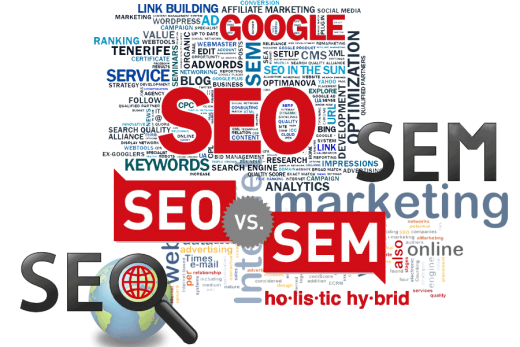What’s the Difference between SEO and SEM?
What’s the Difference between SEO and SEM?
Digital marketing has evolved and so have the terminologies and jargon used in this field. Marketers at some point face challenges, when it comes to choosing specific marketing concepts and approaches. Surprisingly, it is not just the customers who are in a bind when it comes to distinguishing concepts, marketers are equally confused.
Every marketer wants their website to flourish and enjoy top ranking when it comes to SERPS. You have the freedom to use the best serp tracking tools to help you ascertain whether your SEO are paying off. There are instances where the success of your site depends on what you are doing and the strategies you are employing.
The digital marketing space is awash with terms that feature consciously. Top among these are SEO and SEM. Many people will tell you they are one and the same. However, a closer look will tell you that there is a thin line in-between. These two terms can be used interchangeably but they aren’t the same.
SEO and SEM Differences
When trying to demystify the two, it’s advisable to take a look at each term separately. SEO or search engine optimization is an integral part of search marketing. It’s all about optimizing your site to appeal to Google in a captivating way. It’s ideal when you want to draw more traffic and enhance your brand’s visibility.
Search engine optimization keeps evolving in an attempt to match up to the ever changing search engine algorithms. It’s advisable that you understand the core aspects behind SEO and what it’s made up of. The off page and on-page characteristics of SEO are unchanging.
On-page SEO is made of optimized Meta data that brings together the heading tags, page/ title tag, Meta description, and image tag that integrates the main keywords. There is the high value and highly optimized content that carries the keywords. Also, page loading speed and social interaction is part of the on page structure.
When it comes to the off-page SEO, you will encounter tasks and opportunities including link building for inbound juice, social signaling and attraction bookmarking entities. Simply, SEO is charged with creating valuable content that appeals and compels your readership to take action. This is an advantage for your organic traffic goals and ultimately conversions.
SEM-SEO: Which is best?
There is no doubt that its properly crafted SEO that lays the foundation for SEM. Search Engine Marketing ranks above SEO, but it’s still under the overall web marketing strategy that you ascribe to. SEM points to the actual marketing processes that are geared towards growing your brands visibility in search engines. This can be done by attracting free traffic or paid ads. This is like buying ad space where search engines are likely to see you and place you on top of the search results.
SEO has its contribution towards SEM. In fact, SEM is ineffective if you don’t have quality landing pages, a responsive website and content that is optimized for search.
For a marketer with a new site and a practical budget, it’s possible to leverage SEM in the short term to enhance your visibility, but you have to be working on a long term project to build organic traffic. You cannot rely on SEM and sit back. You need to build organic SEO even though a PPC ad campaign can offer temporary solutions.
Is There A Is A Huge Divide between SEO and SEM
Proponents of SEO and SEM will root for either with facts and proof. However, there is compelling evidence that SEO is a precursor for excellent SEM. The content that SEO calls for acts as a base for SEM. That’s why your low quality blogs and pages are likely to hurt your search engine marketing efforts. This could mean your SERP ranking will tumble as well.
You might think that there is a huge divide between SEO and SEM. However, before you choose one over the other, you need to know that businesses vary. There is need to note that SEM traffic apparently the better source of web traffic since it’s usually targeted. Users derived from such numbers will click on a site, find and act upon an ad. Eventually, it will lead to increased conversion. The only misgiving when comparing the two is that SEO will take time to show results while SEM is almost an instant success story. Remember, you will invest more in SEO but it will pay back in the longer run.
Jean Jennings is the content manager of Serpbook. Serpbook is an online platform that gives you information about everything you need to monitor, automate and report on your keyword rankings. It also provides you with local and global SEO rank tracking in real time for Google, Bing, and Yahoo.
(66)



